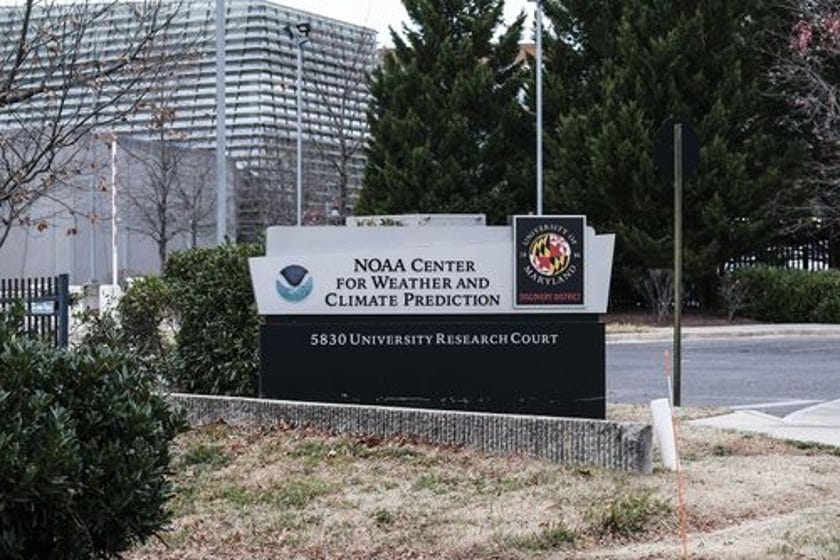Hot Planet Update: NOAA Firings, U.S. Blocks Scientists from IPCC, IRA Methane Fee Repeal, $200B Nature Finance Deal, Wells Fargo Dumps Net-Zero, Cyclone Garance, and More
A roundup of what happened, why it matters, and key context for climate change news during the week of Feb. 23 - March 1.
Welcome to “Hot Planet Update,” a series on Reality Studies that recaps the biggest news in climate from the last week. As we’ve already witnessed in the first month of the Trump presidency—there is going to be a lot of climate-related news in the days, weeks, and months to come.
Adopting a “smart brevity” format, Last Week in Climate recaps are designed to keep you up-to-date on the latest news and provide key context.
The first half of each LWiC is available for free subscribers, and the full post is available to paid subscribers. Subscribe now so you never miss an installment!
1. U.S. blocks its scientists from pivotal global climate report
👉 The Trump administration barred federal researchers from contributing to the UN’s next climate assessment.
The news: U.S. federal scientists have been ordered to stop work on the upcoming IPCC report, breaking with decades of American involvement. A key meeting of report authors (scheduled in China) is now in doubt without U.S. participation.
Why it matters: Experts warn this unprecedented move will weaken international climate science. The IPCC relies on broad collaboration, and excluding American experts could diminish the report’s credibility and comprehensiveness. It follows President Trump’s withdrawal from the Paris Agreement on his first day back in office.
Context: The IPCC assembles input from over 1,000 scientists worldwide for each assessment. Removing U.S. contributors—who played major roles in past reports—threatens to slow global climate action informed by science.
MUD\WTR: Right now, get 30% off on starter packs using this link.
There’s four different adaptogen blends to choose from, but my current favorite is :rest, which helps me ramp down from long days and feel ready for sleep.
2. Mass firings at NOAA spark fears for weather and climate safety
👉 The U.S. National Oceanic and Atmospheric Administration (NOAA) moved to cut hundreds of staff, prompting warnings about public safety and lawsuits from unions.
The news: NOAA has targeted 880 employees for termination, about 5% of its staff, across its weather, ocean, and climate divisions.
Impact: Scientists say gutting NOAA will “put American lives at risk” by hampering weather forecasts and critical climate research. While some life-and-death forecasting roles (hurricane and severe storm warnings) received last-minute exemptions, most departments were hit.
Reaction: Experts say these firings may be illegal, and The National Weather Service union is mobilizing. It scrambled to contact affected members and many fired staff are exploring legal action. A federal court has already put a temporary hold on parts of Trump’s mass firings, an “important initial victory,” according to union lawyers.
Wim Carton & Andreas Malm: Overshoot & Climate Breakdown | Urgent Futures #39
Welcome to the Urgent Futures podcast, the show that finds {signals} in the noise. Each week, I sit down with leading thinkers whose research, concepts, and questions clarify the chaos, from culture to the cosmos.
3. U.S. Congress repeals methane fee, rolling back climate policy
👉 Lawmakers voted to kill a landmark fee on methane pollution, undoing a key part of Biden’s climate legislation.
What happened: The Republican-led Congress approved a resolution to eliminate the new methane emissions fee on oil and gas producers. On Thursday, the Senate voted 52–47 along party lines—after a similar House vote—to nullify the fee before it ever took effect.
Why it matters: Methane is a potent greenhouse gas, and the fee (established under 2022’s Inflation Reduction Act) was designed to push industry to plug leaks. Its repeal “undo[es] a major piece” of former President Biden’s climate strategy, potentially making it harder for the U.S. to curb rapidly warming methane emissions.
Context: The now-repealed fee would have charged energy companies for excessive methane leakage—effectively a carbon price on methane. Oil and gas lobbyists opposed it, arguing it imposed costly burdens. Climate advocates counter that methane has more than 80x the warming power of CO₂ in the short term, so cutting these emissions is critical.
4. Nations strike $200B/year nature finance deal after initial failure
👉 In Rome, countries agreed on a plan to fund biodiversity protection—a boost for global cooperation as U.S. aid retreats.
The agreement: Delegates from around the world approved a plan to mobilize $200 billion annually by 2030 to halt and reverse destruction of nature. This deal, reached on a second attempt after talks faltered last year, outlines who will contribute funds, how they’ll be raised, and oversight mechanisms.
Why it’s big: It’s a rare win for multilateralism amid geopolitical rifts. The COP16 Biodiversity President Susana Muhamad hailed the deal as “a light of hope” that countries can still unite for the global good. Crucially, the plan comes as the U.S.—historically a top biodiversity donor—scales back aid, leaving a financing gap the rest of the world is now working to fill.
Context: The funds will support the Kunming-Montreal Global Biodiversity Framework agreed in 2022, which sets targets like protecting 30% of lands and oceans. With wildlife populations down 73% since 1970, there’s urgency to invest in conservation. Developing nations, led by Brazil, China, and others, drove the deal—and it calls for exploring a dedicated biodiversity fund under the Global Environment Facility.
Mission Farms CBD: My favorite CBD, full stop. They farm the hemp organically on a small Oregon farm, tend every plant by hand, and test for purity four times: the soil, the hemp, the hemp-extract, and the final products.
Go to this link and sign up for emails to get 25% off + free shipping on your first order.
5. Wells Fargo dumps net-zero climate target amid ESG pullback
👉 One of America’s largest banks abandoned its commitment to cut financed emissions, citing tough market conditions and policy headwinds.
The news: Wells Fargo announced it will no longer pursue its pledge to reach net-zero greenhouse gas emissions in its lending portfolio by 2050. The bank also withdrew interim 2030 targets for high-emitting sectors like oil & gas, power, and autos.
Rationale: In its statement, Wells Fargo blamed a lack of supportive “conditions”—pointing to slow policy progress, customer behavior, and technology—for making its climate goals unattainable. This comes as all six big U.S. banks (including Wells) already quit the Net-Zero Banking Alliance in recent months, amid political pushback on ESG investing.
Why it matters: Climate advocates call the move a “cowardly, shortsighted” retreat. Wells Fargo is the world’s 5th-largest fossil fuel financier; its U-turn signals major banks may prioritize business-as-usual over climate promises when pressured. The decision underscores how the Trump administration’s attacks on corporate climate policies are reshaping the finance sector’s approach to sustainability.










